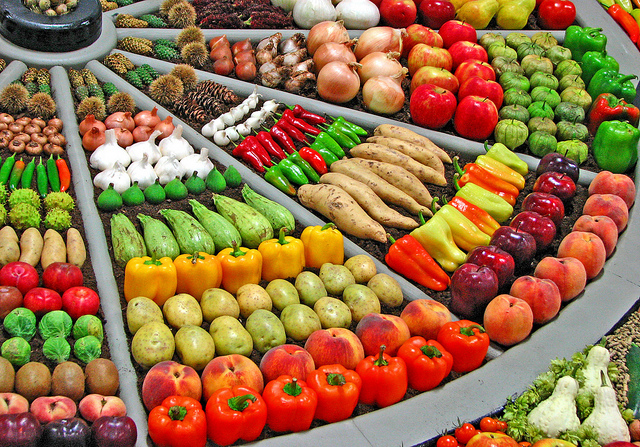Health benefits of vegetablesEating vegetables provides health benefits – people who eat more vegetables and fruits as part of an overall healthy diet are likely to have a reduced risk of some chronic diseases. Vegetables provide nutrients vital for health and maintenance of your body. So let us have a look about health benefits of vegetables.
Why is it important to eat vegetables?
People who eat fruit and vegetables as part of their daily diet have a reduced risk of many chronic diseases. USDA’s MyPlate encourages making half your plate fruits and vegetables.
Vegetables are important part of healthy eating and provide a source of many nutrients, including potassium, fiber, folate (folic acid) and vitamins A, E and C. Options like broccoli, spinach, tomatoes and garlic provide additional benefits, making them a superfood!
Potassium may help to maintain healthy blood pressure. Dietary fiber from vegetables helps reduce blood cholesterol levels and may lower risk of heart disease.
Nutrients almonds, lentils, and eggs
- Most vegetables are naturally low in fat and calories. None have cholesterol. (Sauces or seasonings may add fat, calories, or cholesterol.)
- Vegetables are important sources of many nutrients, including potassium, dietary fiber, folate (folic acid), vitamin A, and vitamin C.
- Diets rich in potassium may help to maintain healthy blood pressure. Vegetable sources of potassium include sweet potatoes, white potatoes, white beans, tomato products (paste, sauce, and juice), beet greens, soybeans, lima beans, spinach, lentils, and kidney beans.
- Dietary fiber from vegetables, as part of an overall healthy diet, helps to reduce blood cholesterol levels and may lower risk of heart disease. Fiber is important for proper bowel function. It helps to reduce constipation and diverticulosis. Fiber-containing foods such as vegetables help provide a feeling of fullness with fewer calories.
- Folate (folic acid) helps the body form red blood cells. Women of childbearing age who may become pregnant should consume adequate folate from foods, and in addition 400 mcg of synthetic folic acid from fortified foods or supplements. This reduces the risk of neural tube defects, spina bifida, and anencephaly during the fetal development.

- Vitamin A keeps eyes and skin healthy and helps to protect against infections.
- Vitamin C helps heal cuts and wounds and keeps teeth and gums healthy. Vitamin C helps in iron absorption.
Health benefits of vegetables
- Eating a diet rich in vegetables and fruits as part of an overall healthy diet may reduce risk for heart disease, including heart attack and stroke.
- Eating a diet rich in some vegetables and fruits as part of an overall healthy diet may protect against certain types of cancers.
- Diets rich in foods containing fiber, such as some vegetables and fruits, may reduce the risk of heart disease, obesity, and type 2 diabetes.
- Eating vegetables and fruits rich in potassium as part of an overall healthy diet may lower blood pressure, and may also reduce the risk of developing kidney stones and help to decrease bone loss.
- Eating foods such as vegetables that are lower in calories per cup instead of some other higher-calorie food may be useful in helping to lower calorie intake.
Photo credit: avrene / Foter / CC BY
You may like to read
Reasons why boiled vegetables are good for health
7 Healthy Summer Foods should Add to Your Diet

